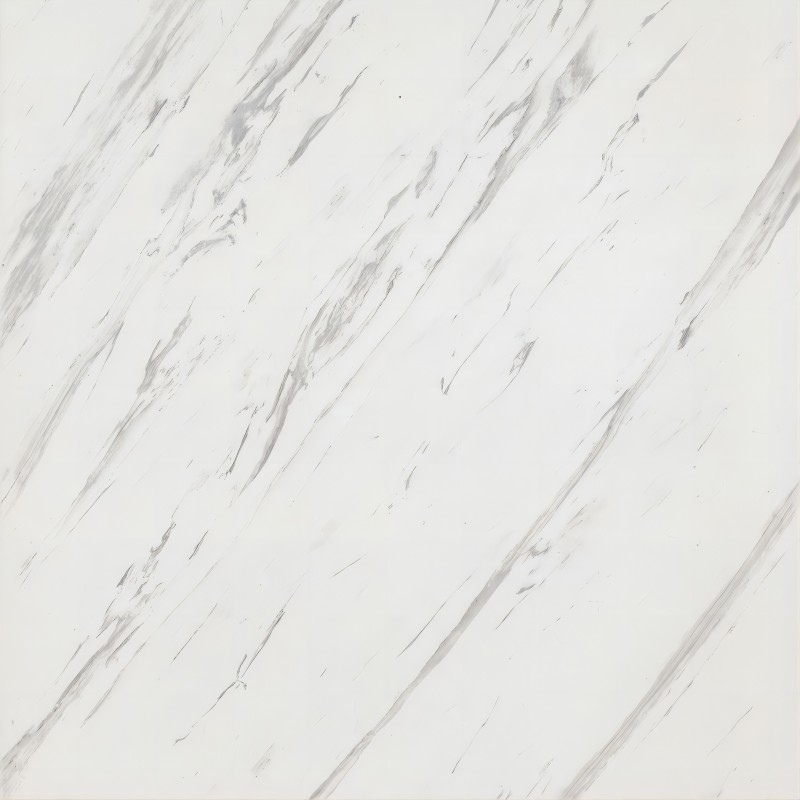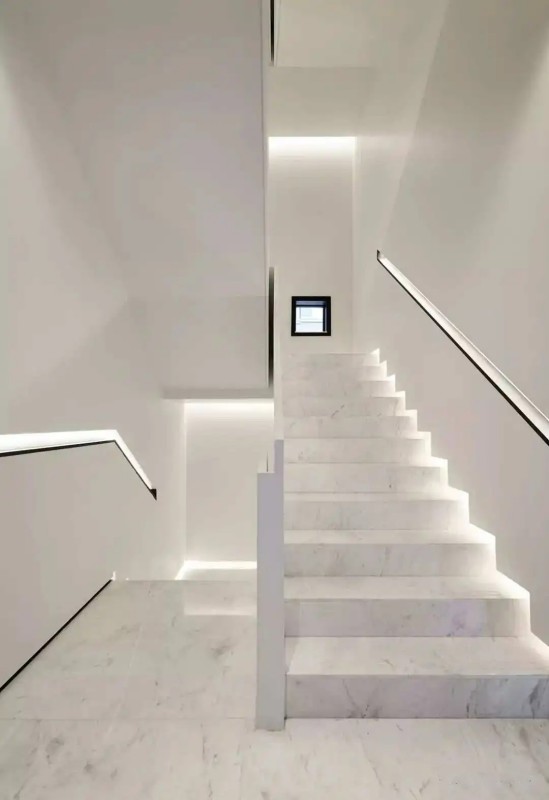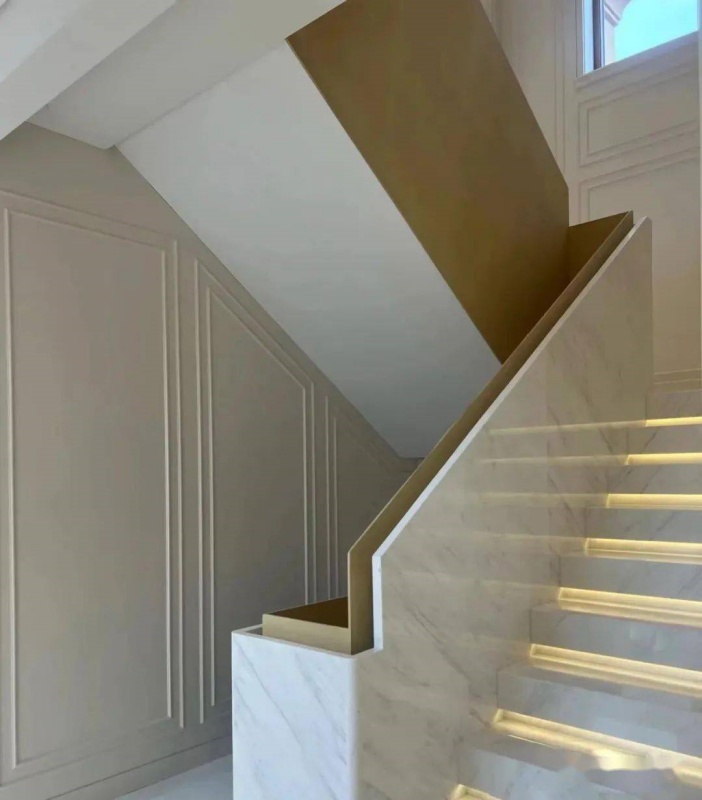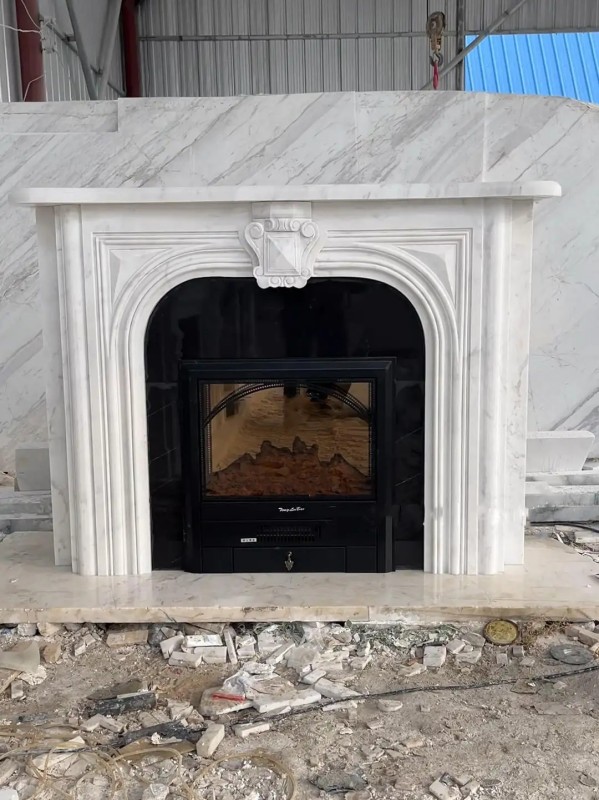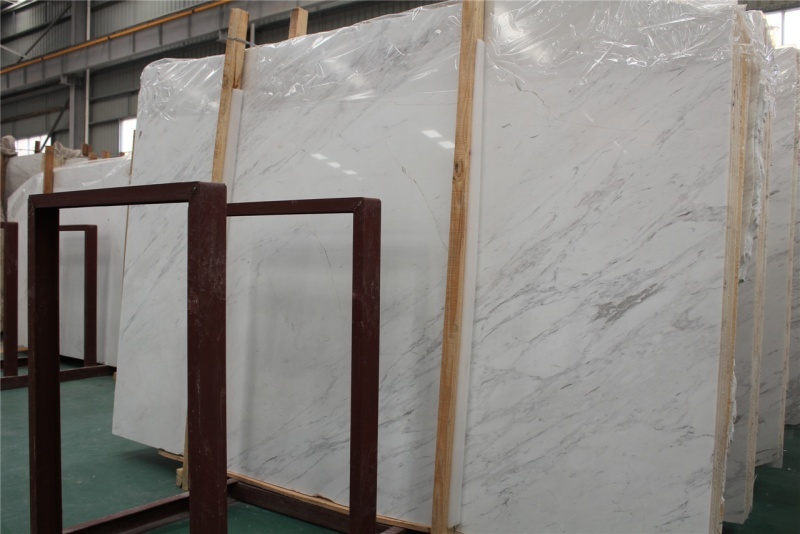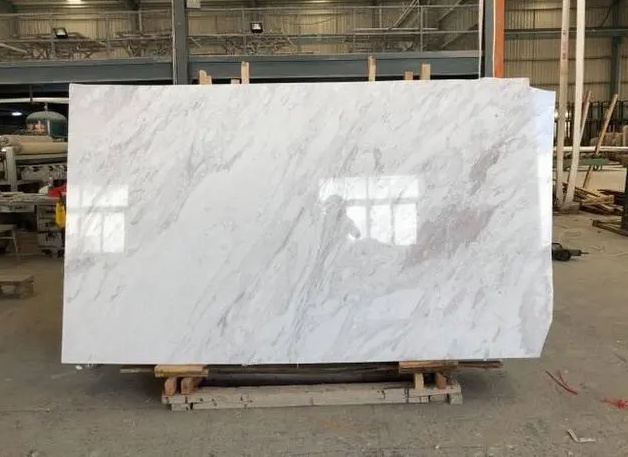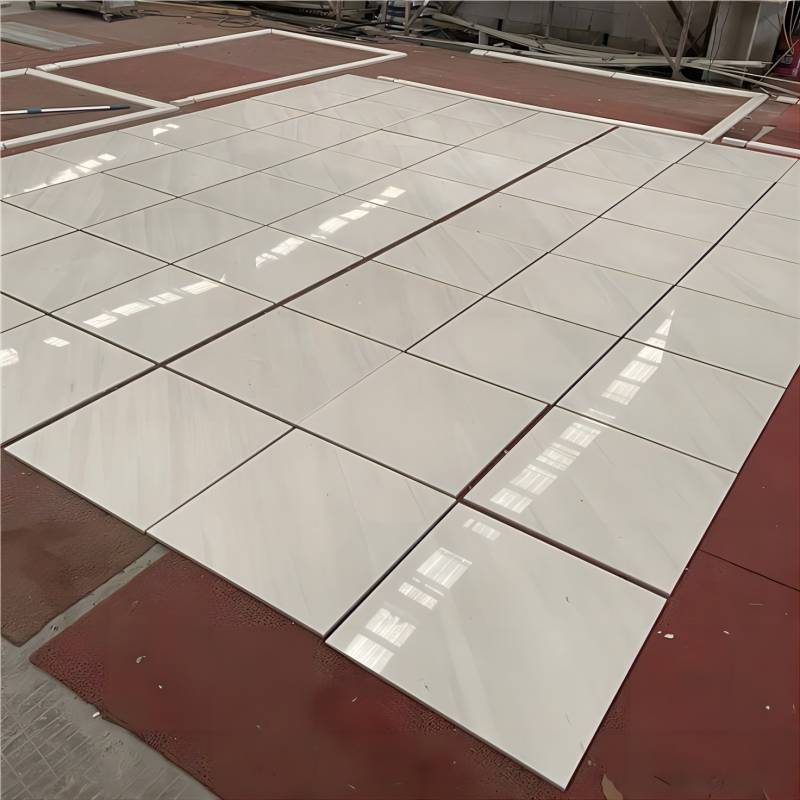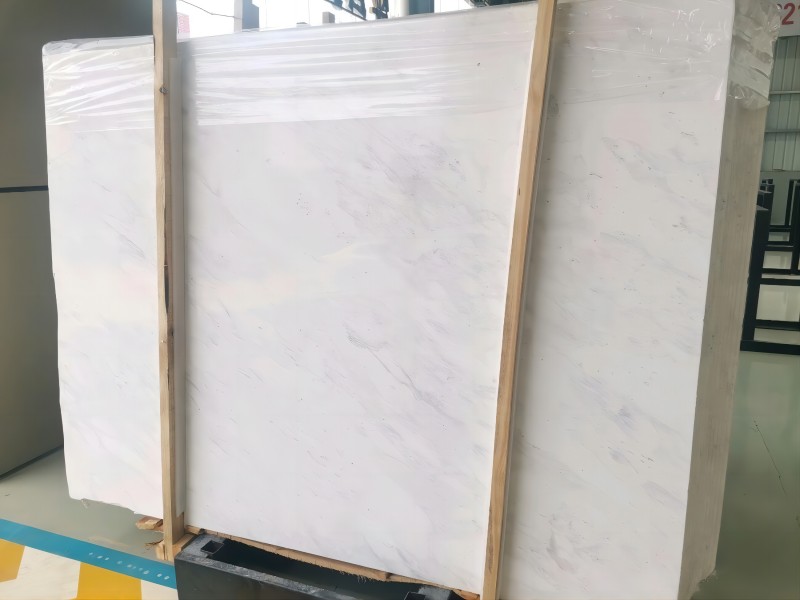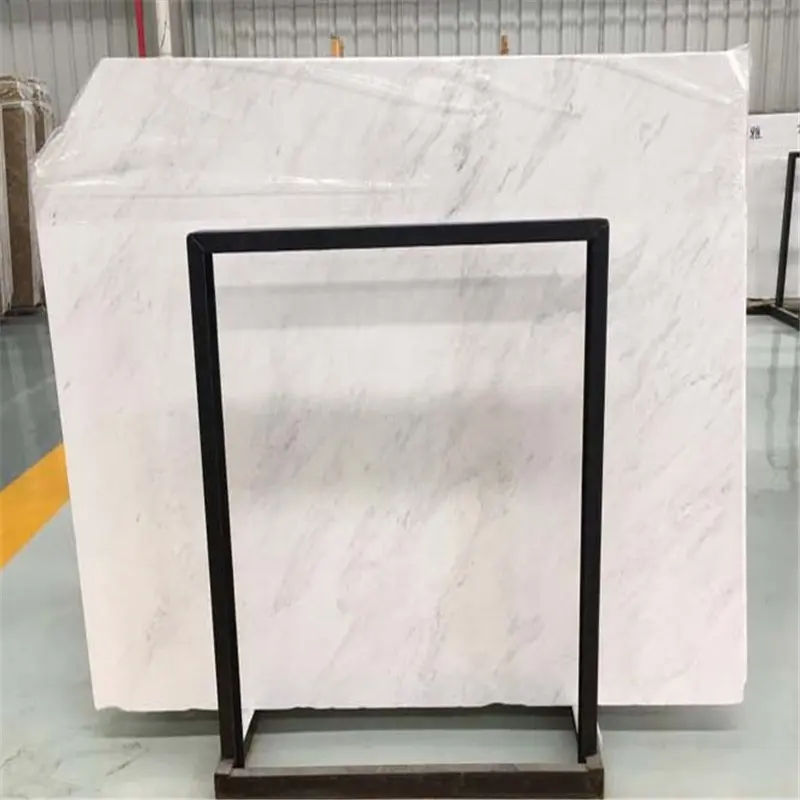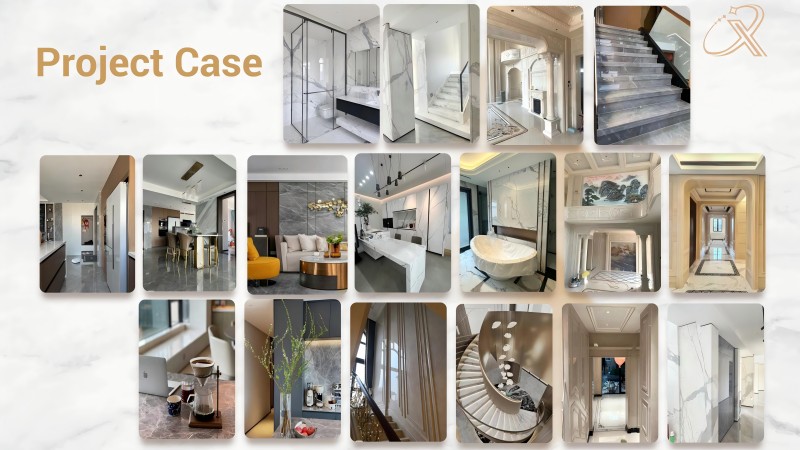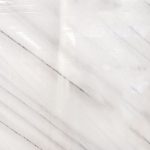Ariston Marble
Ariston Marble is a premium natural stone known for its distinct appearance and aesthetic appeal. It is often used in high-end interior design projects and luxury construction. Here are the key features of Ariston Marble:
Key Features of Ariston Marble
- Color and Appearance:
- Ariston Marble is generally characterized by its elegant and sophisticated color palette, which typically includes shades of beige, cream, and light brown. The marble can also have subtle veins running through it, often in tones of gold, gray, or beige.
- The color variation and veining are usually delicate and consistent, making it highly desirable for creating timeless, classic looks in both residential and commercial spaces.
- Veining:
- The veining in Ariston Marble can vary, but it is generally subtle and refined. The veins are often light and fine, adding an element of movement to the marble’s surface without overwhelming the overall appearance.
- The veins can sometimes have a linear pattern or a more cloud-like design, depending on the specific source of the marble.
- Durability:
- Like most marbles, Ariston Marble is known for being somewhat softer than stones like granite or quartzite. This makes it more prone to scratches and chips in high-traffic areas. It is durable for use in areas where moderate wear is expected, but it may require regular maintenance to maintain its pristine appearance.
- It is often sealed to protect the surface from staining, especially in kitchens or bathrooms where exposure to water and acidic substances could be more frequent.
- Applications:
- Ariston Marble is frequently used in luxury interiors, such as for countertops, flooring, wall cladding, and even decorative pieces like fireplace surrounds or sculptures.
- Due to its elegant and neutral color palette, it is especially popular in modern, traditional, or transitional interiors. It pairs beautifully with a wide variety of other materials, including wood, glass, and metal.
- Origin:
- Ariston Marble is typically quarried in Turkey, much like other high-quality marble varieties. The marble from this region is often highly regarded for its consistent quality and striking appearance.
- Texture and Finish:
- The texture of Ariston Marble is smooth and refined, lending itself well to polished or honed finishes. A polished finish gives it a glossy appearance, while a honed finish offers a more matte look, which is often preferred for a more understated elegance.
- The choice of finish will depend on the desired aesthetic and the functionality of the space.
- Rarity and Cost:
- Ariston Marble is considered a premium marble, and its price can vary depending on factors like the slab size, quality, and finishing options. Its relatively luxurious appearance and limited availability make it an expensive choice compared to more common marbles.
- Maintenance:
- As with all marble, regular sealing is recommended to prevent stains and maintain its appearance. The stone can be more susceptible to acid etching (from substances like lemon juice or vinegar), so careful cleaning and the use of pH-neutral cleaners are advised.
Summary
Ariston Marble is a versatile, high-end material known for its soft, elegant colors and refined veining. It’s ideal for those looking to add a touch of luxury to their space. However, due to its softer nature compared to stones like granite or quartzite, it’s best suited for applications where beauty is prioritized over extreme durability, such as in luxury kitchens, bathrooms, and living areas.
The stone’s classic appeal and sophisticated look make it a popular choice for both contemporary and traditional design projects.
How does compare Ariston Marble to other natural stones in terms of durability?
When comparing Ariston Marble to other natural stones, particularly in terms of durability, it is important to note that marble as a category generally tends to be softer and more porous than harder stones like granite, quartzite, or even some types of limestone. Here’s how Ariston Marble stacks up against other popular natural stones:
1. Ariston Marble vs. Granite
- Hardness and Scratch Resistance:
- Granite is significantly harder than Ariston Marble. Granite typically ranks around 6-7 on the Mohs scale of mineral hardness, while marble, including Ariston, usually ranks around 3-5. This means granite is much more resistant to scratching and abrasion, making it more suitable for high-traffic areas, especially in kitchens or other surfaces prone to heavy use.
- Durability in High-Traffic Areas:
- Granite is ideal for kitchens, commercial spaces, and heavily used countertops because of its resistance to wear and tear. Ariston Marble, on the other hand, is better suited for areas with moderate traffic, as its surface is more prone to scratching and chipping under heavy use.
- Heat Resistance:
- Granite also performs better than marble in terms of heat resistance. Granite countertops can withstand hot pots and pans without being damaged, whereas marble (including Ariston) can suffer from heat exposure, leading to potential discoloration or surface damage over time.
- Stain Resistance:
- Granite is less porous than marble, making it more resistant to staining from oils, acids, and liquids. Marble, including Ariston, tends to absorb liquids and can stain, especially if not sealed properly. Ariston Marble, like all marble, may require more maintenance to keep it looking pristine.
2. Ariston Marble vs. Quartzite
- Hardness and Durability:
- Quartzite is much harder and more durable than Ariston Marble. Quartzite, which forms under intense heat and pressure, is rated around 7 on the Mohs scale, making it harder than granite and more resistant to scratching, chipping, and etching. In contrast, Ariston Marble is more vulnerable to scratching and may be prone to wear in high-traffic areas.
- Acid Sensitivity:
- Quartzite is much less susceptible to acid damage than marble. While marble can be etched by acids (like lemon juice or vinegar), quartzite is more resistant to these effects. This makes quartzite a better choice for kitchens or other spaces where acidic foods or liquids are common.
- Heat Resistance:
- Quartzite performs better under high heat compared to marble, including Ariston. While both stones may be able to withstand heat to some degree, quartzite is less likely to suffer from thermal shock or discoloration.
3. Ariston Marble vs. Travertine
- Porosity:
- Travertine is generally more porous than marble, including Ariston. This means that it tends to absorb liquids more readily and can stain more easily. Ariston Marble, being more refined and denser, is less porous and, with proper sealing, is more resistant to staining than travertine.
- Durability in Heavy Use:
- Travertine, while beautiful, is generally softer and more prone to damage than Ariston Marble. Travertine surfaces can be easily scratched, chipped, or damaged under heavy use, while Ariston Marble offers more protection from these issues (though still not as much as granite or quartzite).
4. Ariston Marble vs. Limestone
- Hardness:
- Limestone is softer than marble, which makes Ariston Marble more durable in terms of scratch and impact resistance. However, limestone has a unique charm and texture that some may prefer, even though it may not be as resilient as Ariston Marble.
- Acid Sensitivity:
- Both marble and limestone are equally vulnerable to acidic substances. The calcite content in both stones reacts with acids, causing etching and surface damage. As such, both require proper care and maintenance to protect against acid damage.
5. Ariston Marble vs. Onyx
- Hardness and Durability:
- Onyx is generally much softer than marble and more prone to scratches and damage, making Ariston Marble more durable overall. Onyx, while prized for its translucence and beauty, is very delicate and can be easily damaged, especially in high-use areas.
- Acid Sensitivity:
- Like marble, Onyx is highly sensitive to acidic substances and can be etched or damaged by contact with foods like citrus or wine. However, Onyx is more prone to damage in general due to its softness compared to Ariston Marble.
Key Durability Considerations for Ariston Marble:
- Scratch and Chip Resistance: As a marble, Ariston Marble is more prone to scratching, chipping, and surface wear than harder stones like granite, quartzite, or even travertine. It is best suited for areas with moderate use.
- Heat Sensitivity: It’s more sensitive to heat than granite or quartzite, so you should avoid placing hot pots or pans directly on the surface.
- Acid Sensitivity: Like all marble, Ariston Marble is vulnerable to etching from acids, which can damage its surface. Regular sealing can help protect against stains and etching, but the surface may still show wear over time.
- Maintenance: Marble requires more maintenance than granite or quartzite. It should be sealed regularly to prevent staining, and care should be taken to avoid acidic cleaners or food contact that can damage the surface.
Conclusion:
Ariston Marble offers a beautiful and luxurious aesthetic with its soft, refined appearance, but it is less durable than harder natural stones like granite, quartzite, and even travertine. It is best suited for low- to moderate-traffic areas or decorative features where beauty and elegance are prioritized over heavy-duty use. For high-performance areas (e.g., kitchen countertops, commercial spaces), you might consider more durable stones like granite or quartzite, which offer greater resistance to scratching, heat, and staining. However, for those who value the classic, refined beauty of marble, Ariston Marble remains a popular choice for luxury interiors, provided its care requirements are understood and managed.
What’s the Application of Ariston Marble?
Ariston Marble a range of high-end interior projects since its beauty and unusual tint are widely appreciated.
- Ariston Marble countertop :Ariston Marble is often used to create stunning kitchen countertops and bathroom vanity tops. Its striking white color and intricate veining add elegance and sophistication to these spaces.
2.Wall Cladding: As a wall covering,Ariston Marble can create a focal point in any room. It is used in both residential and commercial settings to enhance the visual appeal of walls.
3.Flooring: While it is less commonly used for flooring compared to harder stones like granite ,Ariston Marble still be used in areas with light foot traffic, such as bathrooms, entryways, and other interior spaces.
4.Feature Walls: The dramatic veining and color variations of Ariston Marble make it ideal for creating accent walls or feature walls in living rooms, dining rooms, or even hotel lobbies.
5.Decorative Items: Smaller pieces of Ariston Marble, such as tabletops, fireplace surrounds, and decorative objects, can be used to add a touch of luxury and sophistication to interior design.
6.Bathroom Applications: Besides vanity tops,Ariston Marble can be used for shower walls, bathtub surrounds, and other bathroom surfaces to create a spa-like atmosphere.
7.Furniture: Custom furniture items like side tables, dining tables, and coffee tables. These works of art that are also useful elevate any room. Each furniture piece is distinctive and draws attention because of the distinctive patterns and colours of this Ariston Marble
8.Art Installations: Designers and artists frequently work with Ariston Marble to produce one-of-a-kind art installations. In galleries, public areas, and private collections, artistic works are made stand out by the depth and personality that the natural beauty of the stone provides.
What are the unique features of Ariston Marble that make it appealing for interior design?
Ariston Marble has several unique features that make it particularly appealing in interior design, especially for high-end residential and commercial spaces. Its visual qualities, combined with its versatility and timeless elegance, allow it to enhance a wide range of design styles. Here are the key aspects that make Ariston Marble a sought-after material for interior design projects:
1. Elegant, Neutral Color Palette
- Soft Beige and Cream Tones: Ariston Marble is known for its refined, neutral color palette, which includes various shades of beige, cream, light brown, and sometimes subtle hints of gold or gray. These gentle, earthy tones make it incredibly versatile and easy to integrate into different design schemes.
- Calming and Sophisticated: The soft, warm tones help create a serene, sophisticated ambiance. Whether used for walls, floors, or countertops, Ariston Marble can brighten up spaces without overwhelming them, making it ideal for creating tranquil, luxurious environments.
2. Subtle Veining Patterns
- Delicate Veins: Ariston Marble features subtle veining that adds a layer of complexity to the stone without distracting from its overall refined look. The veins can be soft and linear or more cloud-like, typically in shades of gold, light gray, or beige. These veins are often less pronounced than in other types of marble, which lends a quiet elegance and allows the marble to work seamlessly with other materials.
- Natural Variation: Each slab of Ariston Marble has a unique vein pattern, making it one-of-a-kind. This natural variation in design adds an element of exclusivity to any space, as no two installations will look exactly the same.
3. Timeless Luxury
- High-End Appeal: Ariston Marble, with its soft, understated beauty, carries an air of sophistication and luxury. It is often used in high-end projects, such as upscale residential homes, luxury hotels, boutique stores, and commercial spaces. Its timeless aesthetic transcends trends, making it a safe investment for long-term design projects.
- Classic Elegance: Unlike some stones that may trend in popularity and then fade, the elegance of Ariston Marble is enduring. It complements both traditional and contemporary interiors, making it a versatile choice that maintains its value and appeal over time.
4. Versatility in Applications
- Wide Range of Uses: Ariston Marble can be used in various applications, including countertops, flooring, wall cladding, backsplashes, fireplace surrounds, and bathroom vanities. Its subtle beauty makes it appropriate for everything from feature walls to more utilitarian surfaces, where durability and aesthetics need to go hand in hand.
- Seamless Integration: Because of its neutral tones, Ariston Marble works well with other materials such as wood, glass, metal, and even concrete. It can easily blend into modern, minimalist spaces or be used to elevate more traditional designs, making it incredibly versatile in both residential and commercial settings.
5. Luxurious, Smooth Finish
- Polished and Honed Options: Ariston Marble can be finished in both polished and honed surfaces. The polished finish gives it a high-gloss, reflective surface that enhances its elegance and depth, while the honed finish provides a softer, matte look that is more subdued and refined.
- Soft Texture: The smooth texture of Ariston Marble feels luxurious to the touch, adding to its appeal in spaces where tactile experiences matter, such as bathrooms and kitchens.
6. Brightening and Light-Reflective Qualities
- Reflects Natural Light: Ariston Marble’s lighter tones help reflect natural light, brightening spaces and creating an airy, open atmosphere. This makes it a great choice for smaller or darker rooms, as it can make them feel larger and more inviting.
- Optical Illusion of Space: Its ability to reflect light can give the illusion of more space, making it ideal for creating a sense of openness in urban apartments, luxury offices, or even commercial establishments where spaciousness is valued.
7. Elegance Without Being Overpowering
- Subdued Sophistication: Ariston Marble’s understated beauty offers elegance without being overpowering. Its subtle color and delicate veining make it perfect for interiors where the goal is to create a refined, luxurious look without overwhelming other design elements.
- Blends with Any Design Style: Whether you’re designing a sleek, modern space or a more classic, traditional interior, Ariston Marble can adapt seamlessly. It is a particularly good match for transitional designs, where both contemporary and classic elements are integrated.
8. Durability with Proper Maintenance
- Suitable for Low to Moderate Traffic Areas: While marble is generally softer than granite or quartzite, Ariston Marble is still durable enough for use in many interior applications with proper care. It can be used for countertops, bathroom surfaces, and flooring, as long as it is properly sealed and maintained to prevent stains and scratches.
- Aging Gracefully: Like other marbles, Ariston will develop a natural patina over time. This patina adds to the stone’s beauty and character, making it even more desirable in spaces where timeless charm is valued.
9. Compatibility with Custom Designs
- Works Well with Customization: Ariston Marble’s relatively uniform appearance and smooth texture make it ideal for custom design projects. It can be shaped into intricate patterns, custom-cut into unique sizes, and incorporated into bespoke furniture, creating one-of-a-kind design elements in the space.
- Perfect for Statement Features: Whether used as a dramatic feature wall, a luxurious kitchen island, or an eye-catching bathroom vanity, Ariston Marble can be the focal point of the space, adding a layer of sophistication and luxury without overwhelming the overall design.
10. Sustainability
- Natural Stone Appeal: As a natural material, Ariston Marble is a sustainable option for interior design, especially when compared to synthetic materials. It is long-lasting and, with proper care, can be used for decades, reducing the need for frequent replacements or repairs.
Conclusion
The unique features of Ariston Marble—its sophisticated color palette, subtle veining, timeless luxury, and versatility—make it a standout material in interior design. Its elegance and soft beauty allow it to elevate any space, whether modern or traditional, while its durability and ease of maintenance make it a practical choice for a range of applications. For those seeking a luxurious, understated stone that can seamlessly blend into a variety of design schemes, Ariston Marble offers a perfect balance of style, function, and long-term appeal.
Factors affecting Ariston Marble price?
The price of Ariston Marble, like other natural stones, is influenced by several factors that affect both the material cost and the final price of the product, including installation and transportation. Below are the main factors that can influence the price of Ariston Marble:
1. Quality of the Marble
- Color and Veining: The quality of the stone plays a crucial role in determining the price. Ariston Marble with a consistent and uniform color, as well as subtle, elegant veining, is more valuable. Variations in vein patterns and the presence of imperfections or discoloration may lower the price.
- Clarity: Slabs with fewer inclusions (such as mineral deposits or cracks) tend to command higher prices. Flaws like discoloration, fissures, or uneven coloring can reduce the price of the marble.
- Finish: The finish applied to the marble (polished, honed, or brushed) also affects its cost. A polished finish usually commands a higher price due to the more intensive labor and equipment required to achieve the glossy, reflective surface. Honed or matte finishes are generally less expensive, as they require less processing.
2. Size and Thickness of the Slabs
- Slab Dimensions: Larger slabs of Ariston Marble are generally more expensive than smaller ones due to the amount of material used. A larger slab may also be more difficult to transport and install, adding to the overall cost.
- Thickness: Thicker slabs typically come at a premium because they require more raw material, and the cutting and handling of thicker stone adds additional labor costs. Standard thicknesses for marble are 2 cm (3/4 inch) or 3 cm (1 1/4 inch), but custom thicknesses can cost more.
3. Source and Availability
- Quarry Location: Ariston Marble is typically quarried in Turkey, and the price can vary depending on the specific quarry from which the stone is sourced. Marble from more established or renowned quarries may cost more due to its reputation for quality.
- Supply and Demand: The availability of Ariston Marble also affects its price. If there is a high demand for this particular type of marble, the price will likely increase. Conversely, if supply outstrips demand, the price may decrease. For instance, during peak construction seasons or when demand for luxury building materials increases, prices may rise.
- Rarity: While Ariston Marble is considered a premium stone, the rarity of particular color variations or vein patterns can make certain slabs more expensive. Unique or exclusive patterns with distinctive veining may command higher prices due to their rarity and demand.
4. Processing and Fabrication Costs
- Cutting and Shaping: The more intricate the fabrication process (e.g., custom cutting, edging, or intricate inlays), the higher the cost. Custom-designed pieces require skilled labor and more time to cut, which can increase the price.
- Polishing and Finishing: Polishing a marble slab to a high gloss involves specialized equipment and labor, which adds to the cost. Honed finishes, which are smoother but lack the gloss, are less expensive to produce.
- Waste and Yield: The yield from a single block of Ariston Marble will affect the final cost. If the marble is cut into smaller pieces, there is more waste, which increases the price per usable slab. Larger or more precise cuts typically reduce waste and can offer better value, but they may be more difficult and costly to achieve.
5. Transportation and Shipping Costs
- Distance from Quarry to Buyer: The farther the marble has to be transported, the more expensive it becomes. For international shipments, like from Turkey to the U.S., Europe, or other regions, transportation costs can make up a significant portion of the final price. Shipping costs include not just the freight but also specialized packing to protect the stone during transit.
- Logistics and Handling: Due to marble’s heavy weight and fragility, special handling, packaging, and transport arrangements are necessary. Marble slabs often need to be shipped in crates or specially padded containers, adding to the overall cost.
6. Import Duties, Taxes, and Customs Fees
- Tariffs and Duties: If the marble is being imported into another country, import duties and taxes can significantly increase the price. Tariffs on natural stone, especially from regions like Turkey, may vary depending on the country of import and can impact the final cost of the material.
- Customs Processing: Additional costs related to customs processing, documentation, and other administrative fees may also add to the overall price.
7. Labor and Installation Costs
- Installation Complexity: The more complex the installation process (e.g., intricate designs, custom-cut slabs, curved surfaces, or large-format installations), the higher the installation cost. Skilled labor is often required to install marble correctly, and this can make up a significant portion of the total price.
- Regional Labor Rates: Installation costs can vary depending on where the marble is being installed. In regions with high labor costs, the price of installation will be higher, adding to the overall price of the marble.
8. Market Demand and Trends
- Design Trends: Popularity in the interior design market can influence pricing. If Ariston Marble is in high demand due to its aesthetic appeal or trends in architecture (such as luxury kitchens, high-end bathroom designs, or upscale commercial spaces), the price may increase accordingly.
- Construction Boom: During periods of increased construction and renovation activity, particularly in luxury or high-end real estate, demand for premium materials like Ariston Marble rises, which can drive prices up.
9. Brand and Supplier Reputation
- Supplier Reputation: Marble suppliers with established reputations for quality and reliability may charge a premium for Ariston Marble. They offer assurances about the quality, origin, and authenticity of the material, which may justify higher pricing.
- Certification and Authenticity: Some suppliers may offer certification proving the authenticity of the marble, especially if it comes from a renowned quarry or has been sourced sustainably. Certification and proof of authenticity can add to the price due to the added trust and value provided by the supplier.
10. Customization and Special Requests
- Custom Designs: If the marble is being custom-cut or shaped for specific applications (e.g., custom countertops, specialized flooring patterns, or bespoke furniture pieces), the cost will be higher due to the added design and labor work.
- Special Treatments: Special treatments such as anti-slip coatings for flooring or extra sealing for higher protection can also increase the price of the material. Certain applications, especially in commercial spaces, may require additional treatments to enhance the marble’s functionality, such as stain resistance or durability against heavy traffic.
11. Economic Factors
- Global Economic Conditions: The overall state of the economy and natural stone market conditions can affect the price of Ariston Marble. Fluctuations in exchange rates, transportation costs, and commodity prices (such as oil for shipping or energy costs for cutting) can lead to price increases.
- Environmental Factors: Environmental regulations and sustainability concerns in the quarrying process can sometimes affect the price. If certain environmental policies or certifications are required, the cost of sourcing, producing, and transporting the marble may rise.
Why Opt For Xiamen Funshine Stone?
1.Our design consultation service at Funshine Stone gives our customers peace of mind, high-quality stone, and professional guidance. Our expertise lies in natural stone design tiles, and we offer comprehensive “top to bottom” consulting to realize your idea.
2.With a combined 30 years of project expertise, we have worked on a vast array of projects and established enduring relationships with numerous people.
3.With a huge assortment of natural and engineered stones, including marble, granite, bluestone, basalt, travertine, terrazzo, quartz, and more, Funshine Stone is pleased to provide one of the largest selections available. It is clear that our use of the best stone available is superior.








